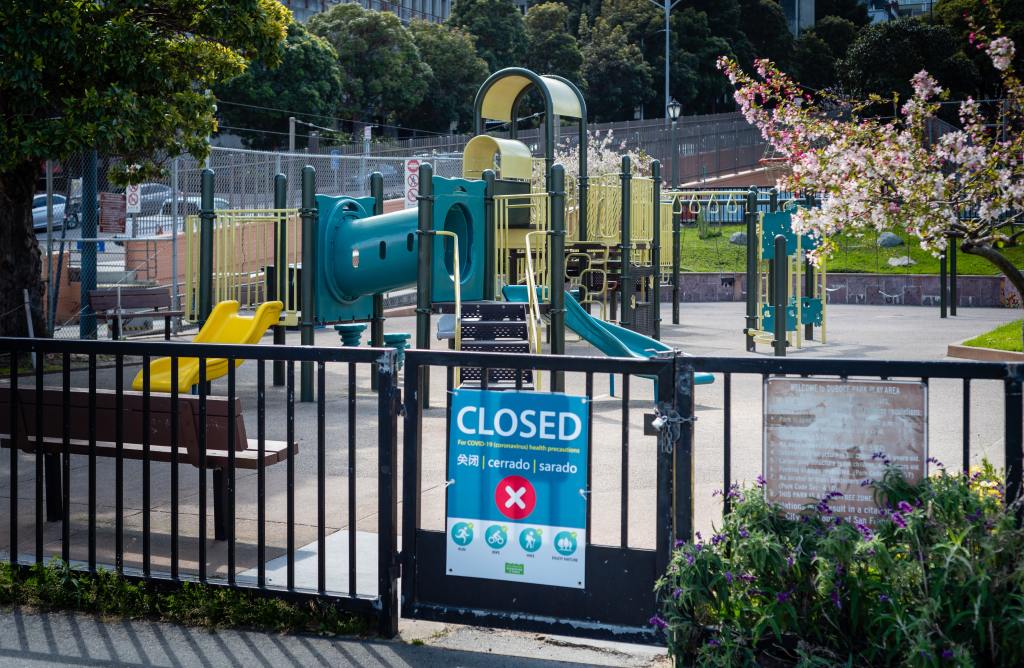Of Children and Lockdowns
July 28, 2020 2 Comments

Photo by Thom Masat on Unsplash
In the heavy lockdown state in which I reside, the early stages of shutdown closed the outdoor playgrounds. They closed the outdoor basketball courts. To drive the point home that children were not welcome, the rims and nets were removed from the backboards—the worry must have been that some child might think of defying the governor’s orders. I noticed at the time that golf courses remained open and were actively used, but I did not hear that many children frequented the fairways or the greens.
We all can agree that the lockdowns and closures of the Great Cessation are not pleasant. There is a general wish that they would not have to happen. There is a variety of views about how necessary this all has been. I have not, though, heard anyone deny that children have been hurt the most.
Consider this partial catalog of harm to the children among us:
Education was abruptly interrupted. Schools were closed.
- In my major suburban county, government efforts to provide “virtual education” were repeatedly tried and failed and eventually abandoned. The virtue remained elusive.
- Education that requires group participation, such as music and arts, became unavailable.
- Field trips were canceled.
- All school clubs’ and extracurricular activities—educationally valuable and greatly desired by children—ceased.
- Personal belongings were quarantined in school lockers for months.
- Public libraries were closed.
- For the fall, the local governments repeatedly tried and failed, and eventually abandoned, efforts to reopen schools. Children will be offered second class education at best. That may work, to a limited degree, for well motivated children with consistent parental supervision. Expect much less success for all the rest.
Social and recreational interaction was interrupted.
- School sports were stopped, including practices, training, games, and facilities. For many, that can include a whole year of skill development, performing, and advancement, a potential disaster for youth counting on a final year to demonstrate skills to help with college admissions.
- School sponsored social events, such as dances, proms, plays, and other recreations were dropped.
- School organized or sponsored service activities have been canceled.
- Children were ordered to stay at home. Enjoyment of friendships and development of camaraderie among peers were interrupted. Usual exchanges with friends and neighbors, and the normal creative interactions, have been stifled.
- The personal exposure to a variety of views and interests and backgrounds became limited.
- Summer camps were closed and seasonal outings were taken off the table.
- Recreational facilities were closed, including parks, sports venues, and pools.
- Movie theaters and other entertainment offerings, such as concerts and spectator sports, became unavailable for warding off youthful ennui.
- Visits to extended family members declined.
Opportunities for character development have been curbed.
- Churches were closed, including worship services, participation in sacred sacraments, associating in youth groups and instruction, joining in varieties of spiritual development activities, and involvement in service to the needy.
- Similarly, the activities of service organizations are curbed, limiting youth participation and volunteer experiences.
- Summer job opportunities became fewer, whether for wages or as summer internships.
Children’s health has been put at risk.
- Regular doctor visits were for a time banned, and then later merely discouraged.
- Routine treatments for chronic ailments were missed.
- Vaccinations and other traditional child medical treatments have been skipped.
- Dental visits were put off, as have been visits to the optometrist.
- Medical attention has not been sought except for what was considered serious ailments or until they became serious ailments.
- “Elective” procedures have been put off.
What do we offer the children in place of what has been closed to them? As mentioned in this litany of childhood harm, local authorities ordered children to remain at home, but what kind of homes? Not all children have the safe, comfortable, well provisioned and lovely homes we would wish or that officials envisioned. Many habitations, rather than a haven and venue for learning, are without parental supervision, are dirty, uncomfortable, and unsafe, exposed to crime, drugs, and gang activity. Children have looked to schools and other facilities, now closed to them by the lockdown, as places of refuge. Lockdown policies can quarantine children into zones of hazard.
As summed up by a recent opinion piece from the American Institute for Economic Research, “Shockingly, it now appears that suicide rates among the young are on the increase, which is concerning since suicide is the leading cause of death for those under the age of 25.” (“CDC Has Become Centers for the Destruction of Childhood,” June 25, 2020)
What do we offer the children in place of what has been closed to them?
Children are the age group least vulnerable to the virus, the fewest to contract it, the quickest to heal, with by far the lowest mortality rate, and the tiniest record for contagion. They have been covered in masks and fed on a daily feast of fear. The irony is that the age group least affected by the virus is the group most deeply harmed by the lockdowns—against which they can do little to protect themselves.
